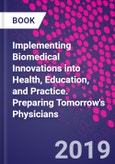Our increased understanding of health and disease coupled with major technologic advances has resulted in rapid and significant changes in the practice of medicine. How we prepare physicians for clinical practice 20, 30, or 40 years from now is of paramount importance to medical educators, to the future professionals, and to society at large.
Implementing Biomedical Innovations into Health, Education, and Practice delves into this important question, discussing the effects of precision medicine, bioinformatics, biologic and environmental forces, and societal shifts on the physician's approach to diagnosis and therapy. The author interviewed world-renowned physicians, medical educators, healthcare leaders, and research professionals-their insights and quotes are woven throughout the narrative.
Professionally illustrated, this relevant resource is a must-have for all medical professionals who incorporate technology and biomedical innovations in their research and clinical practice. It encourages thoughtful analysis on adapting and developing the foundational knowledge, skills, and aptitudes of future physicians and other healthcare professionals, and it belongs in your library.
"Having completed deanship at one of America's leading medical schools, Jim Woolliscroft produces an insightful, contemplative projection of the likely skill and behavioral needs of the physician workforce for the mid-21st century...The result is a playbook for physician training that responds effectively to the daunting challenges faced in the coming transformation of the role of physicians in protecting the health of our nation.�James L. Madara, MD, CEO, American Medical Association
"Dr. Woolliscroft's provocative new book will become must reading for all who are serious about educating the next generation of physicians and health care leaders. Leveraging his own experience as a consummate educator and interviews with numerous thought leaders, he identifies the uncertainties, challenges and disruptions to the practice of medicine in the decades ahead. The implications and imperatives for the coming generations of physicians are compelling and of critical importance for care givers, policy makers, and most pointedly educators in the U.S. and around the world.�Gary S. Kaplan MD, Chairman and CEO, Virginia Mason Health System
"This ambitious masterpiece, by one of the leading medical educators of our time, fully captures the ongoing changes and disruptions in medicine today, and how they will influence the care of patients and the training of young physicians in the future.�Eric Topol, MD, Executive Vice President, Scripps Research, Author of Deep Medicine
Please Note: This is an On Demand product, delivery may take up to 11 working days after payment has been received.
Table of Contents
SECTION I: SETTING THE STAGE1. Life as a mid-21st century physician2. The shaping of 'modern' medical education
SECTION II: CONSTANTS IN MEDICINE3. Healer and pofessional roles4. Communication5. Economics6. Diagnosis and clinical reasoning
SECTION III: DISRUPTORS7. Demographics8. Technology and computing9. Microbiota and the microbiome10. Genetics and molecular biology11. Regenerative medicine12. Precision medicine
SECTION IV: IMPLICATIONS FOR EDUCATORS13. A new mental model for clinical education14. Premedical education15. Medical school education16. Content domains for the 21st century physician17. Graduate medical education18. Educational directions and challenges19. Considerations when designing educational experiences20. Reflections and concluding thoughts








